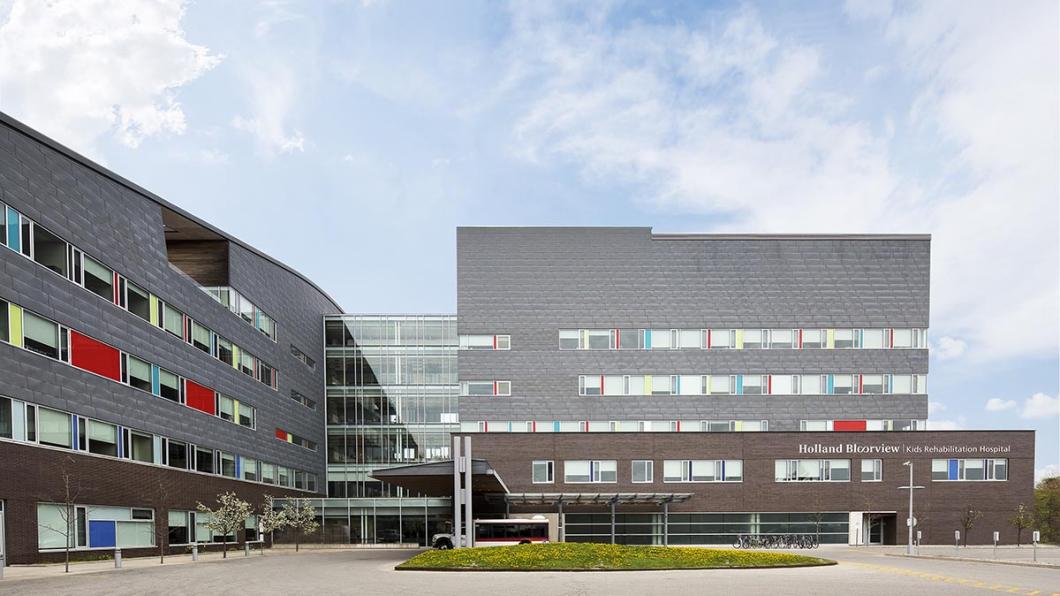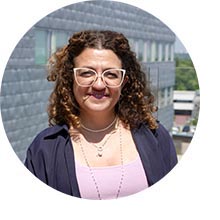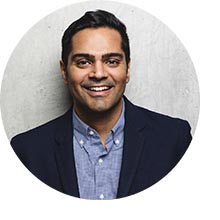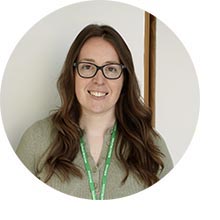
Holland Bloorview is using AI to safely and responsibly advance care for children and youth with disabilities.
As AI continues to rapidly transform health care, Holland Bloorview is taking a proactive approach to ensure its integration aligns with the hospital’s values of safety, equity and human-centered care. Just this month, Holland Bloorview launched a new policy outlining the responsible use of AI tools, including publicly available generative platforms, and introduces governance structures to safeguard privacy and promote fairness.
 “This is an exciting time for Holland Bloorview. We’re ahead of the curve when it comes to AI,” says Enza Dininio, vice president of corporate performance, digital transformation and chief financial officer. “Given how rapidly AI is evolving, we felt it was important to establish a clear framework now, while remaining dedicated to using AI ethically, thoughtfully and in alignment with our strategic priorities.”
“This is an exciting time for Holland Bloorview. We’re ahead of the curve when it comes to AI,” says Enza Dininio, vice president of corporate performance, digital transformation and chief financial officer. “Given how rapidly AI is evolving, we felt it was important to establish a clear framework now, while remaining dedicated to using AI ethically, thoughtfully and in alignment with our strategic priorities.”
Across the organization, teams are already leveraging AI to enhance care and streamline operations. Our administrative teams began piloting AI tools like Copilot over a year ago to reduce administrative burden, specifically associated with booking meetings, taking minutes and drafting documents. AI is also being applied to automate labour-intensive processes, potentially saving hundreds of staff hours annually while improving consistency and efficiency across operations.
 “At Holland Bloorview, we’re leveraging AI to transform how we collect and analyze data across clinical and operational domains,” says Sri Vijay Bharat Peddi, manager of decision support and data analytics, IMT . “These insights help us plan proactively, reduce wait times and deliver more equitable, efficient care.”
“At Holland Bloorview, we’re leveraging AI to transform how we collect and analyze data across clinical and operational domains,” says Sri Vijay Bharat Peddi, manager of decision support and data analytics, IMT . “These insights help us plan proactively, reduce wait times and deliver more equitable, efficient care.”
 “Using Co-pilot/AI tools feels like having my own mini admin by my side,” shares Jamie Marshall, executive assistant and department coordinator, communications and public engagement. “It takes care of the time heavy tasks - drafting messages, sorting information, drafting meeting minutes - so I can focus on the more time-sensitive tasks that need my attention. It’s not replacing my work, it’s making me better at it.”
“Using Co-pilot/AI tools feels like having my own mini admin by my side,” shares Jamie Marshall, executive assistant and department coordinator, communications and public engagement. “It takes care of the time heavy tasks - drafting messages, sorting information, drafting meeting minutes - so I can focus on the more time-sensitive tasks that need my attention. It’s not replacing my work, it’s making me better at it.”
In our Bloorview Research Institute (BRI), research teams are leveraging powerful AI tools to transform data into insights that help us better understand and support each child’s unique journey, bringing us closer to our vision of care that is personalized, timely, and centred on the needs of children, youth and families.
 “In a recent study, we built AI models that predict which types of medications might best support a child’s unique needs,” explains Tithi Paul, research coordinator, Autism Research Centre, BRI. “We demonstrated that AI models can learn from expert clinicians to help us find the right medication, faster. We’ve also leveraged research data to predict who may be at risk of poor mental health outcomes – ultimately helping us minimize avoidable adverse outcomes.”
“In a recent study, we built AI models that predict which types of medications might best support a child’s unique needs,” explains Tithi Paul, research coordinator, Autism Research Centre, BRI. “We demonstrated that AI models can learn from expert clinicians to help us find the right medication, faster. We’ve also leveraged research data to predict who may be at risk of poor mental health outcomes – ultimately helping us minimize avoidable adverse outcomes.”
 "Every day, I see the difference AI makes when children and families get timely, personalized care,” says Dr. Rageen Rajendram, developmental pediatrician. “That’s why in our lab, we’re using AI to tackle the problems that stand between kids and the right help at the right time.”
"Every day, I see the difference AI makes when children and families get timely, personalized care,” says Dr. Rageen Rajendram, developmental pediatrician. “That’s why in our lab, we’re using AI to tackle the problems that stand between kids and the right help at the right time.”
Dr. Rajendram’s team is developing AI models to predict breathing needs in children with Duchenne muscular dystrophy, enabling proactive interventions. They are also creating AI tools to transform autism care pathways, so families spend less time waiting and more time receiving support.
“AI alone won’t change lives,” he adds, “but when used in the right way, it can help us change what’s possible.”
As Holland Bloorview continues to innovate with AI, we are committed to ensuring every step forward is grounded in ethical leadership, human oversight and a deep commitment to inclusive, responsible care.
By Terry Mutuku